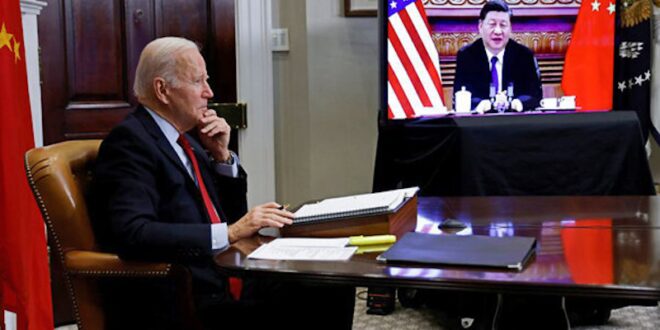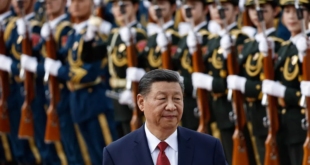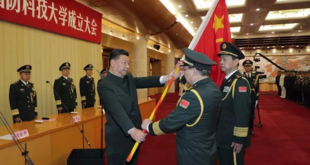On 15 November 2021, Chinese President Xi Jinping and US President Joe Biden held their first virtual meeting. According to the White House’s readout, Biden told Xi that the two countries should establish ‘common sense guardrails to ensure that US–China competition does not veer into conflict and to keep lines of communication open’. Judging from the press release published by Xinhua, the Chinese state news agency, which is over six times the length of the White House’s readout, the precondition for any ‘common sense guardrails’ appears to be that Washington must treat China with ‘respect’.
Treating China with respect is the first of the three principles that Xi mentioned to Biden during their meeting. The other two were peaceful coexistence and win-win cooperation. This means that China not only wants the United States to not criticise or subvert its one-party system. It wants the United States to go a step further: to recognise, in words and in deeds, that China’s one-party system is morally on par with, if not superior to, a liberal democratic form of government.
That would mean Beijing wants Washington to accept that if there are elements of the rules-based international order that the Chinese leadership deems incompatible with its domestic political system, it is legitimate for China to diverge from them. For example, the rules-based international order defines human rights as inalienable individual rights; but China’s political system subordinates human rights to an absolute interpretation of national sovereignty and state (implying regime) security. There is little scope for Xi to respond to the criticisms against the Chinese government’s human rights performance with the sort of changes that Washington would like to see. China under Xi has become more adept at using international platforms, especially those in which it has the upper hand, like the Shanghai Cooperation Organization and the South-South Human Rights Forum, to show that its state-centric notion of human rights already enjoys widespread acceptance.
In another telling example of what putting China’s domestic political system above the rules-based international order looks like, Biden complained to Xi that China’s trade and economic practices are unfair to US workers and industries. The unfairness Biden alluded to originates in China’s top-heavy, party-led and state-centric economic system that makes use of national industrial policies, including massive subsidies and preferential policies, to groom state-owned enterprises and domestic private companies as globally competitive ‘national champions’. This distorts the playing field for foreign companies in China, and, as Chinese companies increasingly expand their global footprints, for companies outside China too.
But in Xi’s view, China’s top-heavy economic system is a part of its political system, where the Chinese Communist Party ‘superintends the whole situation and coordinates all sides’, mobilising resources from state and private sectors alike to achieve the strategic national goal of making China strong. This implies, in Xi’s view, that respecting China’s political system requires the United States to respect that China should not be held to account to the rules and norms of a free market economy, even if it is discriminatory toward non-Chinese companies.
Xi’s requirement for Biden to exercise self-restraint in relation to Taiwan should also be read in light of his expectation that the United States should treat China with respect. Xi told Biden that the way China pursues its core interests is utterly ‘defensive’. By implication, this includes China’s repeated military intimidation over Taiwan, which China sees as a part of its ‘sacred territory’.
The Xinhua press release states that Biden supports the ‘one China’ policy and opposes Taiwan’s independence. But it conspicuously leaves out any reference to the relevant statement, directed at China’s intimidation over Taiwan, in the White House’s readout: ‘the US opposes unilateral efforts to change the status quo or undermine peace and stability across the Taiwan Strait’. In lieu of it, the Xinhua release states that Xi warned Biden to ‘handle the relevant issues’ surrounding China’s sovereignty with ‘prudence’. This conveys Xi’s expectation of Biden to distance the United States from Taiwan diplomatically and militarily.
Besides respecting what China deems as its domestic affairs, Xi made it clear that treating China with respect requires the United States to welcome China as its equal on the world stage. In practical terms this means embracing China in global initiatives led by the United States, and by implication, those of its allies and partners too.
Xi told Biden that China has treated the United States with respect by keeping open the ‘global initiatives China has proposed’ to it. He immediately added, ‘we hope the reverse is also true’. This is to say that China disapproves of US–led initiatives such as the Build Back Better World Partnership — launched by the G7 to provide funding to poorer countries for infrastructure construction as an alternative to China’s Belt and Road Initiative.
Xi’s demand for Biden to treat China with respect means that any ‘common sense guardrails’ that can be put in place to regulate US–China competition must display a full acceptance of China’s political system — in the way Xi understands it.
 Eurasia Press & News
Eurasia Press & News




